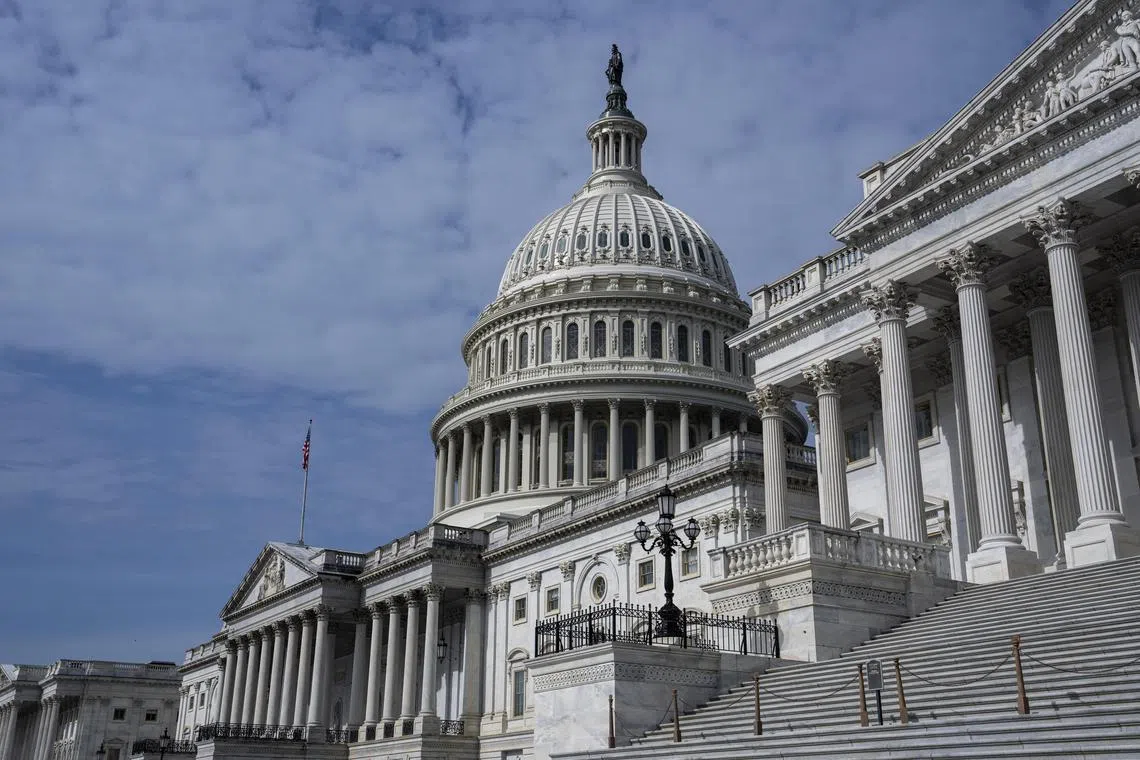Wall Street bosses warn US debt talks already doing damage
Sign up now: Get ST's newsletters delivered to your inbox

US President Joe Biden and congressional leaders have yet to reach a deal to raise the debt limit.
PHOTO: NYTIMES
New York - Up and down Wall Street, teams are huddling inside banks and gauging the risks to themselves, their clients and markets if US lawmakers fail to raise the debt ceiling.
Executives from banks including the nation’s three biggest – JPMorgan Chase & Co, Bank of America and Citigroup – are spreading the word inside Washington’s corridors of power, and sometimes even publicly, that the damage to US businesses and the economy will start well before a technical default.
Financial firms are already racking up expenses as they rush to prepare, assigning workers and executives – including heads of trading, corporate banking and consumer banking – to study how the government’s failure to pay bills would cascade through markets, according to people with knowledge of the situation.
Efforts to brace balance sheets and advise clients on contingency planning are prompting a surge of costly hedges.
“We want to make sure market participants have a collective sense of how the system, the pipes that make things function, will work in the event of a breaching of the debt ceiling,” said Mr Rob Toomey, the head of capital markets at the Securities Industry & Financial Markets Association, a major trade group. “It’s never happened, so we don’t know to what degree the markets will be impacted.”
United States President Joe Biden and congressional leaders in both parties emerged from a White House meeting on Tuesday offering glimmers of hope about eventually reaching a deal to raise the debt limit, even as they conceded they were still far from averting a default that could come as soon as June 1.
One challenge complicating Wall Street’s case for more urgency is, ironically, also coming from markets, where stock prices and bond trading remain relatively stable.
Many investors see a default as so obviously catastrophic – akin to mutually assured destruction in nuclear war – that they have been behaving as if Democrats and Republicans will absolutely come together to hash out a solution, just as they have in the past.
While that is also the view of many rank-and-file bankers, the industry’s leaders have grown concerned enough to assign significant resources to preparing for the worst, taking fresh looks at potential risks, their balance sheets and even the legal language underpinning trades or assets.
JPMorgan chief executive Jamie Dimon went as far as describing his team’s preparation as a “war room”.
Some bankers are quick to point out that they are always working on managing risks.
Just two months ago, they were trying to anticipate what kinds of problems might come their way from troubled regional lenders.
But an unprecedented US debt default is both harder to model and far more catastrophic, requiring far more time and personnel.
One thing that makes that work slightly easier is that banks have seen deadlock over the debt ceiling in the past, giving them ample opportunities to create – and now dust off – plans for what to do if a deal is not reached in time.
While finance industry leaders have routine conversations with top regulators, their joint focus on the debt ceiling has intensified in recent weeks, the people with knowledge of the situation said.
Some senior bank executives have been asked to talk through the various scenarios with the Treasury Department and Mr Biden’s economic advisers, describing the effects a default could have on their business and clients.
Among the notes that industry leaders keep hitting is that a prolonged stand-off could hurt confidence in US creditworthiness, likely raising costs for the nation’s taxpayers and taking a toll on investors and companies around the globe, the people said.
“The last thing that the world and America needs is to have a debt ceiling crisis,” Citigroup CEO Jane Fraser said on Bloomberg Television earlier in May, calling the consequences “quite dire” for consumers, corporates and investors.
On Tuesday, more than 140 top business executives from finance, real estate and other industries urged swift action to avert a “potentially disastrous” default.
A stalemate over the debt ceiling in 2011 that ended without default depressed stock prices, slowed economic growth and eliminated jobs, they wrote in a letter to Mr Biden and top congressional leaders.
And last week, 17 of Wall Street’s most experienced traders issued a public warning to Treasury Secretary Janet Yellen.
“The short-term impacts of a protracted negotiation are costly; the long-term implications of a default are unthinkable,” the group of current and former leaders of the Treasury Borrowing Advisory Committee, which advises the department on borrowing, wrote in a letter to Dr Yellen.
Signatories included Goldman Sachs Group co-head of global banking and markets Ashok Varadhan and financing group co-leader Beth Hammack, as well as former JPMorgan chief operating officer Matt Zames.
At the same time, industry groups are preparing market participants for a period not yet seen or tested, to avoid anyone being caught on their back foot.
Sifma, whose broker-dealer members command more than 80 per cent of US market share, has been publishing materials to help securities firms plan for three potential scenarios: a delay of principal payment, coupon payment, or absence of an extension of operational maturity, according to an updated internal deck.
If such an unprecedented event does occur, Treasury and other government announcements will be communicated on five scheduled conference calls daily between 6.45am and 2pm. BLOOMBERG


